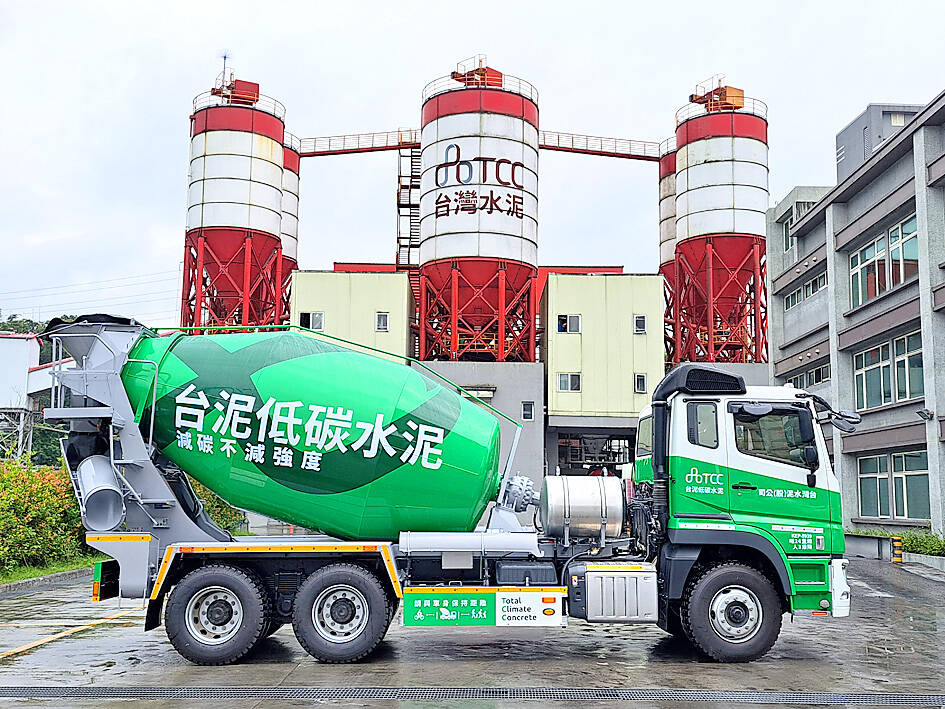Taiwan Cement Corp (台灣水泥), the nation’s biggest cement maker, yesterday reported that its net profit expanded 48 percent annually last year, thanks to contributions from its power-generation business in Taiwan and cement products with low carbon footprints sold in Europe.
Net profit grew to NT$7.99 billion (US$253.09 million), from NT$5.4 billion in 2022, the company said in a regulatory filing.
Earnings per share rose to NT$1.06, from NT$0.74 a year earlier.

Photo courtesy of Taiwan Cement Corp
While revenue last year fell 4.1 percent to NT$109.31 billion, from NT$113.93 billion, gross margin improved by 9.9 percentage points to 18.8 percent and operating margin rose 8.2 percentage points to 9.2 percent, reflecting the company’s efforts to enhance its profitability amid economic headwinds.
In the October-to-December quarter alone, the company’s net profit fell 27.6 percent year-on-year to NT$1.8 billion and revenue decreased 18.2 percent to NT$28.35 billion.
Taiwan Cement said in a statement that about 45 percent of its net profit last year came from low-carbon cement products sold in Europe.
As the cement market in China continues to slump with the supply and demand imbalance unlikely to reverse in the near-term, tapping into the low-carbon cement market in Europe from 2018 proved a necessary move to grow revenue and profit, as well as increase investment outside of China to diversify risk, the company said.
Taiwan Cement is the leading cement producer in Taiwan, Turkey and Portugal, and has a decent position in several southern and southwestern Chinese provinces.
It has a 38 percent market share in Taiwan and is the seventh-largest cement producer in China, company data showed.
In 2018, the company established a joint venture with Turkey’s OYAK Cimento AS and invested in Portuguese cement company Cimpor Portugal SGPS SA through that joint venture, Taiwan Cement said.
The joint venture’s net profit has grown six times in the past five years, and it is making a marked contribution to the parent company, it said.
Taiwan Cement said it is in talks with OYAK to acquire more of the highly profitable Turkey and Portugal cement operations — hoping to raise its stakes in the former from 40 percent to 60 percent and in the latter from 40 percent to 100 percent — as it aims to control the operations and further diversify its cement business globally.
If it closes the deals by the end of this quarter, as expected, the investments would not only create more income from its Turkey and Portugal operations, but also generate more free cash flow, which Fitch Ratings has said would more than compensate for the acquisition costs and help improve Taiwan cement’s leverage profile.
Taiwan Cement also generates stable cash flow from its coal-fired Ho-Ping Power Plant in Hualien County and has in the past few years expanded its green-transition businesses, including battery manufacturing in Kaohsiung, as well as energy storage and electric vehicle charging networks in Taiwan and abroad, which are conducive to its plans to ensure it has diversified and resilient operations in the long term, it said.

When an apartment comes up for rent in Germany’s big cities, hundreds of prospective tenants often queue down the street to view it, but the acute shortage of affordable housing is getting scant attention ahead of today’s snap general election. “Housing is one of the main problems for people, but nobody talks about it, nobody takes it seriously,” said Andreas Ibel, president of Build Europe, an association representing housing developers. Migration and the sluggish economy top the list of voters’ concerns, but analysts say housing policy fails to break through as returns on investment take time to register, making the

NOT TO WORRY: Some people are concerned funds might continue moving out of the country, but the central bank said financial account outflows are not unusual in Taiwan Taiwan’s outbound investments hit a new high last year due to investments made by contract chipmaker Taiwan Semiconductor Manufacturing Co (TSMC, 台積電) and other major manufacturers to boost global expansion, the central bank said on Thursday. The net increase in outbound investments last year reached a record US$21.05 billion, while the net increase in outbound investments by Taiwanese residents reached a record US$31.98 billion, central bank data showed. Chen Fei-wen (陳斐紋), deputy director of the central bank’s Department of Economic Research, said the increase was largely due to TSMC’s efforts to expand production in the US and Japan. Investments by Vanguard International

WARNING SHOT: The US president has threatened to impose 25 percent tariffs on all imported vehicles, and similar or higher duties on pharmaceuticals and semiconductors US President Donald Trump on Wednesday suggested that a trade deal with China was “possible” — a key target in the US leader’s tariffs policy. The US in 2020 had already agreed to “a great trade deal with China” and a new deal was “possible,” Trump said. Trump said he expected Chinese President Xi Jinping (習近平) to visit the US, without giving a timeline for his trip. Trump also said that he was talking to China about TikTok, as the US seeks to broker a sale of the popular app owned by Chinese firm ByteDance Ltd (字節跳動). Trump last week said that he had

STRUGGLING TO SURVIVE: The group is proposing a consortium of investors, with Tesla as the largest backer, and possibly a minority investment by Hon Hai Precision Nissan Motor Co shares jumped after the Financial Times reported that a high-level Japanese group has drawn up plans to seek investment from Elon Musk’s Tesla Inc to aid the struggling automaker. The group believes the electric vehicle (EV) maker is interested in acquiring Nissan’s plants in the US, the newspaper reported, citing people it did not identify. The proposal envisions a consortium of investors, with Tesla as the largest backer, but also includes the possibility of a minority investment by Hon Hai Precision Industry Co (鴻海精密) to prevent a full takeover by the Apple supplier, the report said. The group is